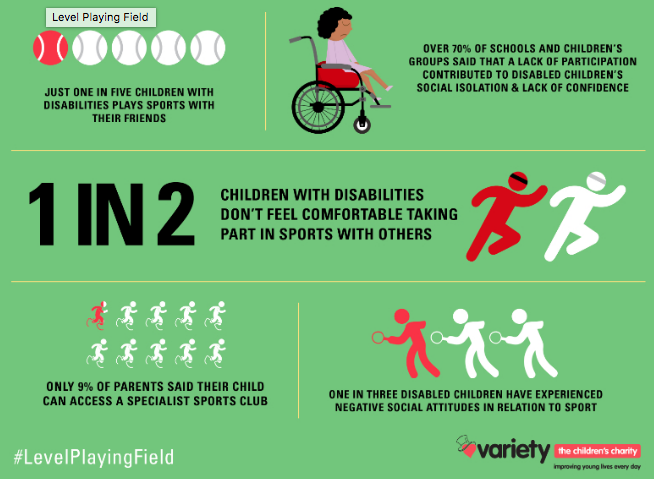Para-Olympics. The Invictus Games. The World Para-Athlete Championships. This guy, Hector Picard, a double amputee competing in the Ironman Triathlon in Kona, Hawaii.
Inspiring, right? We watch and cry and applaud the courage, heart, and determination on display from these incredible athletes. So why is it that our children are still facing tremendous barriers to participating in sport as adaptive athletes?
There is good news and bad news.
Social Stigma in Sport
First the bad news. According to a recent report published by Variety, the children’s charity, the number one barrier to differently abled children participating in sport is the social stigma associated with their conditions. From the study:
- One in two (50%) parents surveyed with a child with disabilities aged 4 to 18 say their child doesn’t feel comfortable taking part in sports with other children.
- Over a third (36%) of parents reported that their child had experienced negative social attitudes to their health problem or disability, in relation to sport.
The consequences are far-reaching. Some children with special needs have increased risk of being overweight. Their lack in participation in sport due to social stigma, associated costs, and fear of failure or injury places them at a higher risk. Additionally, children with disabilities who lack consistent therapy face increased isolation, increased care requirements, decreased mental health, increased fear and anxiety, and shortened lifespans.
It’s not just fact or statistics. The self-reporting bears out the science. According to the Variety study, “Over 70% of those schools and voluntary sector groups who expressed an opinion said that a lack of participation contributed to disabled children’s social isolation and lack of confidence or reduced their life experiences. Others reported a negative impact on emotional and physical wellbeing.”
But wait! I have good news.
Benefits of sports for adaptive athletes.
The health benefits of swimming for individuals of all abilities have been well-documented, both here and elsewhere. And the research is clear on the mental and social benefits for the athlete. One study (among many) found that when participating in sports, adapted athletes believed they exceeded the expectations associated with their specific disability, specifically by the demonstration of a fit, muscular, and liberated body exhibiting physical skill.
“Participation in this setting is unexpected and emphasizes an alternative representation of a disabled body.”
How do we fight social stigma?
Perhaps the most revolutionary, important news in the aid to remove stigma, however, is what happens when average children and adults are paired with those who are differently abled. When the two groups engage with each other in a sport and adaptive sport setting, perceptions change for the better. And yes, I have a study for that too. We can change our own and others’ (often unconscious) negative expectations of children with disabilities by getting involved.
About that.
Want to know what the number two barrier is to adaptive athletes participating? Cost. Cost of facilities and equipment, of suitable transport, and of coaching and membership.
At One with the Water we are actively working to smash both of those barriers, but we can’t do it without you. We need you to engage, whether it be by participating in swim lessons, or helping to offset the cost. When you donate to One with the Water, you impact a child’s life on every plane – mentally, physically, and emotionally. For their lifetime.
Donate Today
Molly is a member of our creative team, mom of four water-loving babies, and a fierce advocate for CPR training and really early swim instruction.

